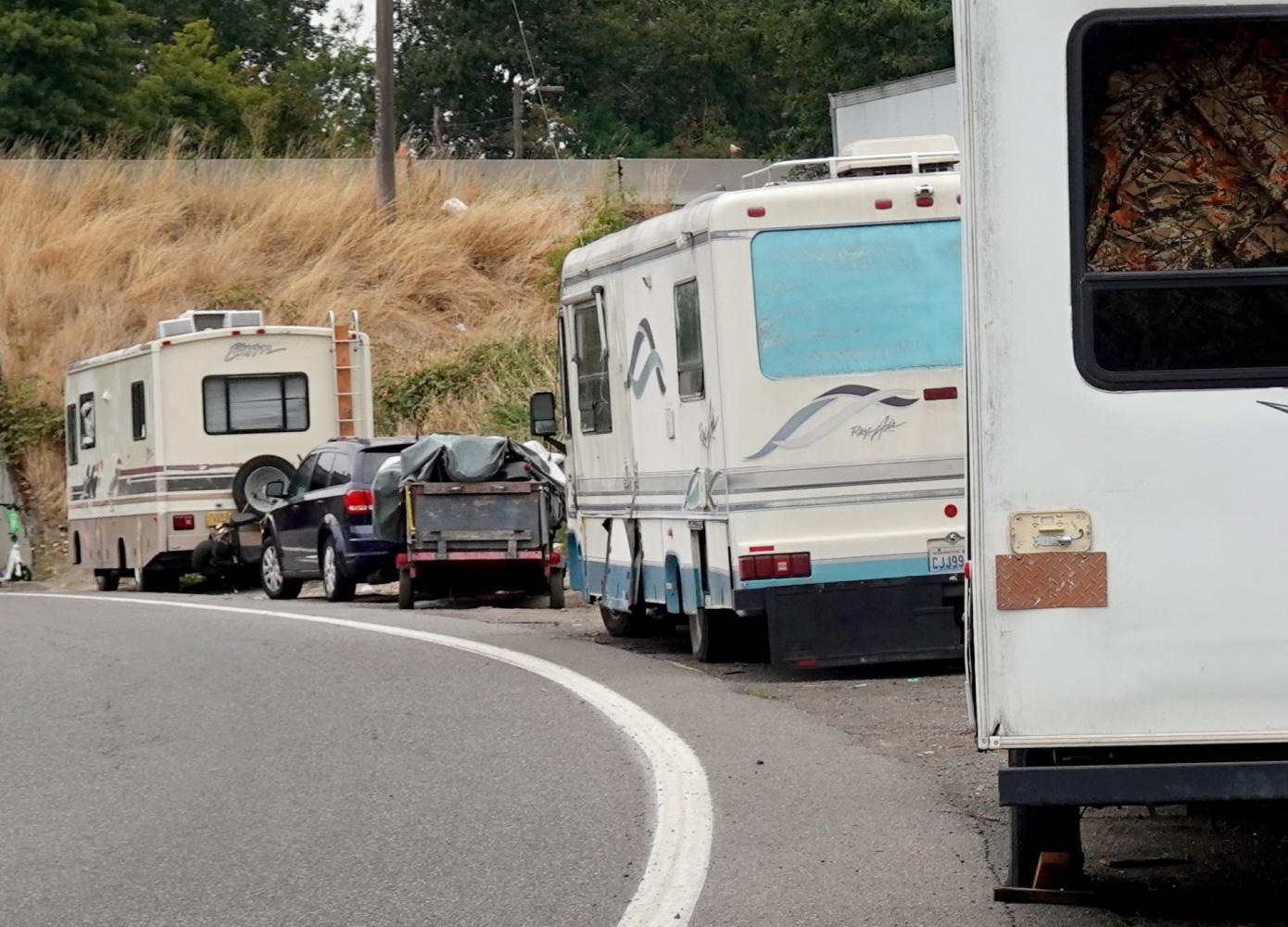

Published on: 09/12/2025
This news was posted by Oregon Today News
Description
For the last five years, Rachelle Lacy-Powell has kept her entire life inside two vehicles: A Honda Odyssey minivan and a recreational vehicle. Lacy-Powell, 59, used the van to run errands and drive herself to appointments, while sleeping in the RV.
“That’s all I had,” she told OPB. “My lifeline.”

Lacy-Powell panicked three weeks ago when she discovered a green notice stuck to the windshield of each vehicle on a street in Southeast Portland. The city had determined that her vehicles were “abandoned,” according to the note, and would be towing them within 10 days. Without enough money to pay for gas to move both, she quickly moved everything into her RV and drove it to another street.
Her van was towed, and she said she hasn’t had the time or transportation to retrieve it. She said she now lives in fear that her remaining vehicle could be towed any time.
“Living alone as a woman on the street, this isn’t the life I wanted,” she said. “But I have one place where I feel safe, my RV. And the city wants to take that away?”
Mayor Keith Wilson wants to make it easier to do so.
Months ago, Lacy-Powell would have been able to pick up her towed van for free, under a policy that waives towing costs for “lived-in” vehicles retrieved within 30 days. But Wilson reversed that policy last month. Soon, getting her van back would cost more than $300.
It’s part of a coordinated effort from the mayor’s office to crack down on cars and RVs that people are living in that appear inoperable or severely damaged, criteria that meet the city’s definition of a “derelict” vehicle.
“[Lived-in vehicles] pose an unacceptable risk to the community,” Wilson said at an August city council meeting. “We need to re-establish community standards on public safety and sanitation.”
It’s also a fundamental piece of Wilson’s main campaign pledge – to end unsheltered homelessness by Dec. 1.
Less than three months from his self-imposed deadline, Wilson is looking to the city’s towing policies to expedite the process of moving people off the streets. It’s a move celebrated by some neighbors who have long urged the city to address the public safety threat of neglected RVs, but introduces anxiety to others who feel they have no choice but to live in these vehicles.

Wilson said the city’s transportation bureau tows roughly 35 derelict RVs each month. He hopes to nearly triple that number to 96 by next month.
The campaign is meant to target RVs that are considered dangerous — whether that’s because they’re blocking bike lanes and crosswalks, dumping waste and oil onto the street, or creating health hazards for occupants. But it’s also meant to encourage people living in RVs to move into the growing network of temporary, overnight-only shelter beds.
“The hazards produced from having these unlicensed and unregistered vehicles on Portland streets pose substantial problems for those living in them and for the communities where they are parked,” Wilson said in an email to OPB. “The city is engaging in balanced enforcement of our existing code and regulations to reduce a significant and increasingly pervasive problem from our streets, while expanding access to safe, life-saving shelter.”
Not all RV residents see shelters as an acceptable replacement.
Wilson’s overnight shelters are all considered “congregate,” meaning they’re large rooms filled with dozens of beds lined up in rows. Lacy-Powell has an anxiety disorder and said she was assaulted at a shelter in the past, meaning she doesn’t feel safe sleeping in an open room with strangers.
She has tried to move into a mobile home park with her RV, which is registered in her name, but found that few parks accept vehicles that are over a decade old like hers. She wants to move into her own apartment, but has been stuck on numerous affordable housing waiting lists for years and can’t find any market-rate rentals in her budget.
“It’s not like I’m not trying,” Lacy-Powell said.

Kristle Delihanty, who runs the homeless day center PDX Saints Love, believes Wilson’s focus on RVs will make things worse for people already living in desperate situations.
“My fear is more vulnerable people being exposed to all kinds of threats, whether it be the elements as we’re coming into fall and winter, or sex trafficking as a way to find shelter,” said Delihanty, who was homeless in the Portland area a decade ago. “These are things that we are going to see when we continue to take safety and stability away from people.”
Delihanty, who has previously raised concerns with how Wilson has rolled out his homelessness plan, said the city should be focusing on opening more “safe park” lots where people can legally park their RV and stay overnight, and get connected to longer-term housing programs through on-site staff.

Some local elected officials agree. Multnomah County Commissioner Shannon Singleton spent years working for local homeless services nonprofits. She sits on a joint city-county board that oversees the region’s homelessness response alongside Wilson and others.
“Instead of adding to people’s challenges and taking away their vehicles, I would rather us be finding a solution,” Singleton told OPB. “Like asking, ‘Do we need more mobile home parks? Do we need more safe park sites?’”
Wilson has been firm that RVs, even those at permitted safe park sites, shouldn’t replace a shelter bed or sleeping pod in an outdoor shelter. This month, the only city-run safe park site will close after its extended lease on Port of Portland land near the airport ends. It accommodated 55 vehicles. Wilson has expressed no interest in replicating that model elsewhere after it closes.
In June, city council adopted Wilson’s budget that put nearly $1.5 million toward towing and demolishing more derelict RVs. His goal is to tow at least 1,300 RVs by July 2026, the beginning of the next fiscal year. Between July 2024 and July 2025, the city towed roughly 680 RVs. In that same time, it received more than 18,000 reports about derelict RVs from the public.

The city holds onto towed RVs and other lived-in vehicles for 30 days. Until it was rescinded last month, a 2017 policy allowed people to pick up their vehicle for free during that time frame, as long as they have paperwork proving it’s registered in their name. They can also retrieve personal items left behind in their vehicles, regardless of whether they can prove ownership. After 30 days, the RVs are dismantled by a contractor — a process that can cost upwards of $2,000 per vehicle, according to city spokesperson Laura Rude.
“Derelict RVs are very expensive problem for the city,” she said, “And a lot are in pretty bad shape.”
Rude said older RVs can cause heightened health issues for tenants, neighbors and the contractor who dismantles them. Many have asbestos and mold in their walls. Portland doesn’t offer any electricity hook-ups for RVs within city limits, which leads some RV residents to use gas stoves inside the vehicle. “So then there’s carbon monoxide poisoning risks and fires,” Rude said.
She said that by reversing the fee waiver for RV retrieval, the city is keeping people safe from these threats and turning the vehicles into a less viable shelter option.
It’s unknown how many people took advantage of the fee waiver to retrieve their vehicles in the past eight years. The Portland Bureau of Transportation, which oversee city towing, was unable to provide data on the program’s use.
Councilor Eric Zimmerman ran on a campaign that pledged to ban RV camping on city streets. He agrees with Wilson’s policy.
“They have a terrible impact on every single neighborhood in Portland,” he said of the vehicles. “I consider them a lot worse than tents. We shouldn’t make it free for people to get them back. There needs to be a barrier.”
But Zimmerman hesitates to embrace Wilson’s temporary shelters as an alternative to RVs. Zimmerman wants to see more outdoor village shelters, like the city’s outdoor alternative shelters.

“I’m a pod shelter person,” he said. “The right to a door that closes is the best model we have right now. We need more of that. But the mayor introduced these nighttime only shelters. That’s his thing.”
Portland has a policy that bans people from living outside, including in vehicles. But, under the city’s rules, it can’t be enforced until there are enough shelter beds available to accommodate the city’s population of unsheltered people. Wilson is currently 630 beds toward his goal of opening 1,500 new shelter beds by December. But even if he reaches this milestone, it won’t be enough to meet the estimated population of 7,000 people living outside in Multnomah County.
But, with significant vacancies at some of the new overnight shelters, Zimmerman said it’s time to act.
“As long as we have vacant shelters, we have reason to move people off the street,” he said.
Lacy-Powell said she moves her RV every four days, to avoid another tow warning. It’s another thing that keeps her from focusing on her main goal of getting into permanent housing. Lacy-Powell said she became homeless in 2017, after wrist injuries incurred from domestic violence cost her her job as a dental hygienist.
“I lost my income, my house, my community – everything just fell apart. And I’ve never been able to pick myself back up again,” she said. “There’s always another obstacle in my way.”
News Source : https://www.opb.org/article/2025/09/12/portland-mayor-keith-wilson-policy-change-houseless-people-towed-rvs/
Other Related News
09/12/2025
Dobrev was spotted walking a red carpet at the Toronto International Film Festival last we...
09/12/2025
In October a new community health center and pharmacy will be coming to Wheeler Oregon The...
09/12/2025
The Oregon Department of Environmental Quality has fined a polluting wood treater in north...
09/12/2025
DEAR MISS MANNERS I have a boat and needed to dry my beach towels after a recent excursion...
09/12/2025











